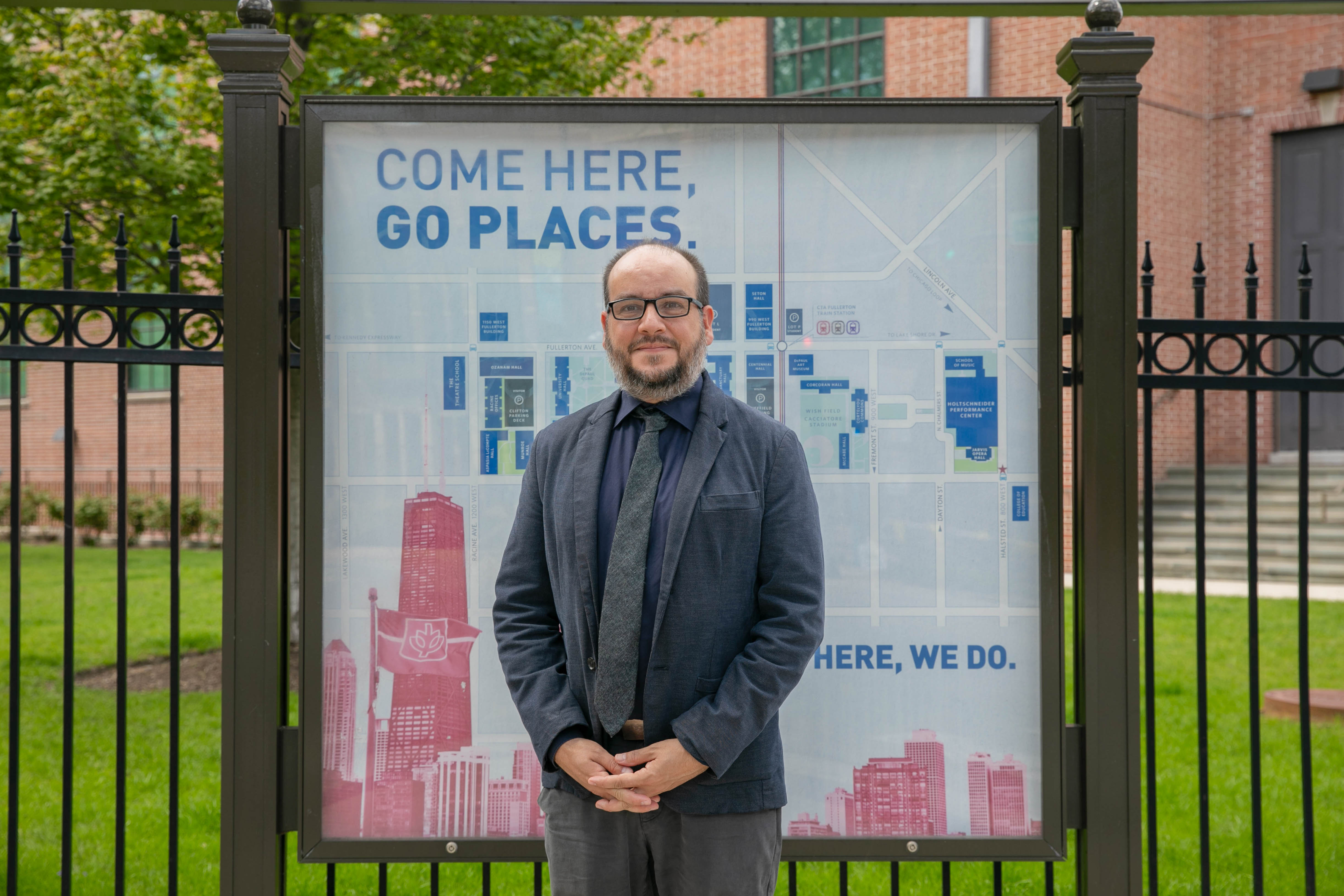
Sociology Professor Fernando DeMaio is also the vice president of health equity research and data use at the American Medical Association. (Photo by Lavanya Chetal/DePaul University)There is a growing need for health care and public health professionals in the United States. A 2022 survey reports up to 47% of health care workers may leave their jobs by 2025 and public health workforce data indicates 44% of workers were considering leaving their jobs during the pandemic. Factors including burnout and an aging population have deepened the need for nurses, doctors and public health care professionals. But with great need comes great opportunity, and DePaul is working to meet this increasing demand by preparing Blue Demons to be the next generation of health care workers. The university offers 13 majors and minors related to health sciences, has established numerous partnerships with Chicago institutions such as the Center for Community Health Equity with Rush University Medical Center and strives to connect students with hands-on experiences to advance their learning and careers.
For the last five years, Sociology Professor Fernando De Maio has used his position as vice president of health equity research and data use at the American Medical Association’s Center for Health Equity to conduct research on the root causes of health inequities, including racism. During this time, he has opened opportunities for DePaul students through the Master of Public Health program, which requires students to complete a practicum, and the LAS Undergraduate Research Assistant Program, which provides students with a stipend to work on faculty-led research projects. Since 2020, De Maio has hosted six students, who have contributed to a variety of projects at the AMA.
“Our students did not hesitate to dive into researching issues of racism in medicine,” De Maio says. “Their contributions made a difference in AMA research, informing key aspects of our work, from educational content in our strategic plan on the impact of racism in health care to empirical studies quantifying how racism is discussed in medical journals.”
Sights set on social services, reproductive health
 Mary Kate Gruening began her work with the AMA as an undergraduate at DePaul. (Photo provided by subject)
Mary Kate Gruening began her work with the AMA as an undergraduate at DePaul. (Photo provided by subject)A double major in Women’s and Gender Studies and Peace, Justice and Conflict Studies, Mary Kate Gruening is the only undergraduate to have worked with De Maio in the AMA Center for Health Equity thus far. During her time in the program, Gruening assisted with research examining the social determinants of health, such as income and education level, through an intersectional lens.
“The concepts of health equity, social determinants of health, race-based health inequities and social justice issues have critically framed my career goals and passions,” Gruening says. “My time studying at DePaul and researching with the AMA ignited my passion for health equity.”
Gruening graduated in March 2025 and plans to launch a career in social services, addressing health inequities at a grassroots level. After gaining some professional experience, she hopes to enroll in DePaul’s MPH program and concentrate on maternal and child health.
“I want to obtain comprehensive doula training, too,” she says. “My goal is to work in reproductive justice, operating through an anti-racist and intersectional feminist lens.”
Aiming for internal medicine
 Hassan Ahmed, an MPH student at DePaul, seeks to advance health equity in chronic health issues. (Photo by Lavanya Chetal/DePaul University)
Hassan Ahmed, an MPH student at DePaul, seeks to advance health equity in chronic health issues. (Photo by Lavanya Chetal/DePaul University)Improving healthcare access for underserved populations is the motivation behind Hassan Ahmed’s studies in the MPH program. During his time interning with the AMA this academic year, Ahmed has engaged in various projects that helped him understand how systemic factors shape health outcomes and the importance of data-driven solutions in addressing disparities.
“This opportunity has reinforced for me how medicine, policy and community health are deeply interconnected,” Ahmed says. “I witnessed how the AMA actively works to improve healthcare access, amplify marginalized voices and advocate for systemic change.”
Ahmed is preparing to graduate from DePaul this June and plans to pursue a residency in internal medicine. With an interest in clinical research and community health, he hopes to devote his skills to addressing chronic health issues within the community.
“My AMA and DePaul experiences have strengthened my commitment to advancing health equity through clinical care and policy reform,” Hassan says.
Moving forward
The AMA’s work on health equity is based on a vision of “a nation where all people live in thriving communities where resources work well, systems are equitable and create no harm, and everyone has the power to achieve optimal health—and all physicians are equipped with the consciousness, tools and resources to confront inequities as well as embed and advance equity within and across all aspects of the health system.” DePaul students are contributing to that important work, and with a record of scholarly contributions, the door is open for students to continue this effort.
Learn more about DePaul’s Center for Community Health Equity and the MPH program online.